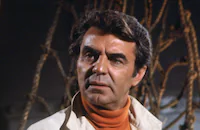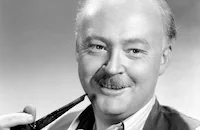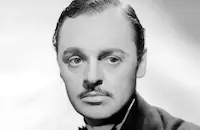The System
Cast & Crew
Lewis Seiler
Frank Lovejoy
Joan Weldon
Bob Arthur
Paul Picerni
Donald Beddoe
Film Details
Technical Specs

Synopsis
Although it is generally known that John E. Merrick heads the local unit of a nationwide gambling syndicate, the citizens of Clarkton consider him to be a respected businessman, well-intentioned citizen and generous neighbor. John is also a family man and proud of his son Rex, who is studying to be a lawyer at the state university. When John learns that Rex's friend Ricky Gerber has been killed robbing a diamond store for money to pay off gambling debts, John fires bookie Angelo Bruno, who lured Ricky to gambling and then pressured him for payment. However, after learning about the death, newspaper reporter Jerry Allen, a longtime friend of John and father of Rex's best friend, Jerry, Jr., feels compelled to start a "crusade" against local gambling. He convinces his chief, Roger Stuart, to let him do a series of articles on Clarkton's gambling activities, unaware that Stuart has an ulterior motive for granting permission. Although Jerry does not name names in his initial articles, everyone in town knows that he is targeting John. In a businesslike way, John prepares to weather the storm caused by the controversial articles with the help of his lawyer, Brady, and his accountant, Liggett. He then confronts both Jerry and Stuart about their reasons for commencing with an exposé after all these years. From these conversations, he learns that Jerry's motives are a mixture of honest citizen outrage and a desire for a Pulitzer prize, but that Stuart is simply trying to break up John's romance with his daughter Felice. When Jerry's articles explore the possibility that John's company is involved in interstate gambling, the head of the gambling syndicate, Big Reuben, gets nervous that he will be implicated and sends his brother Marty to demand that John "take the heat off," even if it means breaking up with Felice. When Jerry's articles pique the interest of Senator Richard Ketteridge, John tries to end the relationship to protect Felice from scandal, but she remains steadfast. However, other friends do not remain as loyal, as Ed Jelke, whom John helped get placed in the sheriff's department, delivers the subpoena for company tax records, and the board of directors of the country club that John helped to build ask him to resign. Although Liggett cleans out the records dealing with out-of-state transactions, Frank Tasker, who has worked in accounting for twenty years, is also subpoenaed. When he begs not to have to perjure himself, John, against Brady and Liggett's advice, tells Frank to tell the truth. On the day the Ketteridge investigation is to begin, Big Reuben and Marty send their nephew "Specs" and a psychotic Chicago gunman, Little Harry, to kill Jerry. Meanwhile, after a public acknowledgment of Jerry's death, the hearing begins and witnesses are called to the stand by chief counsel David Wiley. Angelo testifies that John provided capital for him to start a gambling operation. Frank perjures himself by saying that he does not know the nature of John's business, as he only counts the money. When the feisty Felice is called to testify, she evades their questions, but when the prosecutor gets rough with her, John disrupts by ordering them to leave her alone. During a break, Rex shows up to stand by John, but wanting to protect his son, John orders him to leave. Hurt by John's brusqueness, Rex goes to the Allens' house, where he learns about Jerry's death. When the hearings resume, John is called to the stand. Although he evades most of Wiley's questions, John claims he is not engaged in gambling and that his business is not a franchise of a nationwide wire service. However, the hearing is suddenly adjourned when police interrupt to report that Rex has committed suicide. That evening, the grieving John is summoned to the local police station, where the inspector has picked up two men who he believes are Jerry's killers, but whom he cannot hold without witnesses. Ignoring Brady's advice, John identifies the men as Harry and Specs, then manipulates Harry into exposing Specs, Reuben and Marty, even though the confession will also bring him down. When the hearing resumes, Harry is called to the stand and confesses everything, accusing Reuben and his family, and incidentally, John. When recalled to the stand, John admits to his interstate gambling activities and is immediately arrested on perjury charges for his previous testimony. As the police take John away to be tried in a federal court, Felice follows to say goodbye and declares that she still loves him.

Director
Lewis Seiler
Cast

Frank Lovejoy

Joan Weldon
Bob Arthur

Paul Picerni

Donald Beddoe

Jerome Cowan
Dan Seymour
Sarah Selby
Fay Roope
Frank Richards
Henry Corden
Howard Negley
Al Gordon
Bruno Vesota
Richard Garrick
Paul Birch
William Vedder
Forbes Murray
Brian O'hara
Chet Marshall
Michael Pierce
Ray Bennett
Forrest Burns
Elizabeth Flournoy
Sammy Finn
Ivan Browning
Charles Watts
Milton Wood
Grandon Rhodes

Paul Maxey
George Sherwood
Norman Field
Lloyd Dawson
Larry Blake
Frank Marlowe
Gail Ganley
Anne Lavelle
Ernestine Barrier
Crew
Gordon Bau
John Beckman
Sam Bischoff
David Buttolph
Mel Dellar
Edwin Dupar
Jo Eisinger
Edith Grafton
Samuel Grafton
Lou Jenning
Clarence Kolster
Charles Lang
Lloyd Maclean
Maurice De Packh
Lyle B. Reifsnider
Howard Shoup

Film Details
Technical Specs

Articles
The System -
By Richard Harland Smith

The System -
Quotes
Trivia
Notes
Although his appearance in the film has not been confirmed, a December 1952 Hollywood Reporter news item added Lyle Ince to the cast. Portions of the film were shot on location at the Lakeside Country Club in Los Angeles, according to a November 1952 Hollywood Reporter news item. The System marked Joan Weldon's film debut.














